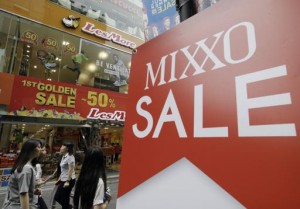- California Assembly OKs highest minimum wage in nation
- S. Korea unveils first graphic cigarette warnings
- US joins with South Korea, Japan in bid to deter North Korea
- LPGA golfer Chun In-gee finally back in action
- S. Korea won’t be top seed in final World Cup qualification round
- US men’s soccer misses 2nd straight Olympics
- US back on track in qualifying with 4-0 win over Guatemala
- High-intensity workout injuries spawn cottage industry
- CDC expands range of Zika mosquitoes into parts of Northeast
- Who knew? ‘The Walking Dead’ is helping families connect
S. Korea’s growth slowest in more than 2 years

People walk past sale signs at a Seoul shopping district, South Korea, Thursday, July 23, 2015. South Korea’s quarterly growth slowed to the lowest in more than two years as a severe drought hit agriculture and an outbreak of Middle East respiratory syndrome sapped consumption.(AP Photo/Ahn Young-joon)
SEOUL, South Korea (AP) — South Korea’s quarterly growth slowed to the lowest in more than two years as a severe drought hit agriculture and an outbreak of Middle East respiratory syndrome sapped consumption.
The economy expanded 2.2 percent in the second quarter over a year earlier, the Bank of Korea said Thursday. That’s the lowest since the first quarter of 2013. Asia’s fourth-largest economy eked out 0.3 percent growth from the previous quarter.
The bank said private consumption turned negative as spending on services dropped while agricultural output plunged due to a drought.
South Korea’s economy was expected to ebb last quarter as foreign tourists cancelled visits and people stayed home because of the MERS outbreak which began in May and has killed 36 people.
No new confirmed cases of MERS have been reported in South Korea since July 4 and tourist numbers have begun to recover.
To help local restaurants, retailers, hotels and tourism industries, the government has been encouraging South Koreans to spend their vacations within South Korea.
Other areas of the economy including exports and private investment were also weak.
South Korea’s finance ministry is seeking parliamentary approval for a $10.6 billion stimulus package to aid recovery and to achieve annual growth of 3 percent this year.
But many forecasters, including South Korea’s central bank, predict that the country’s economy will expand less than 3 percent in 2015, which would mean a slowdown from the previous two years.















